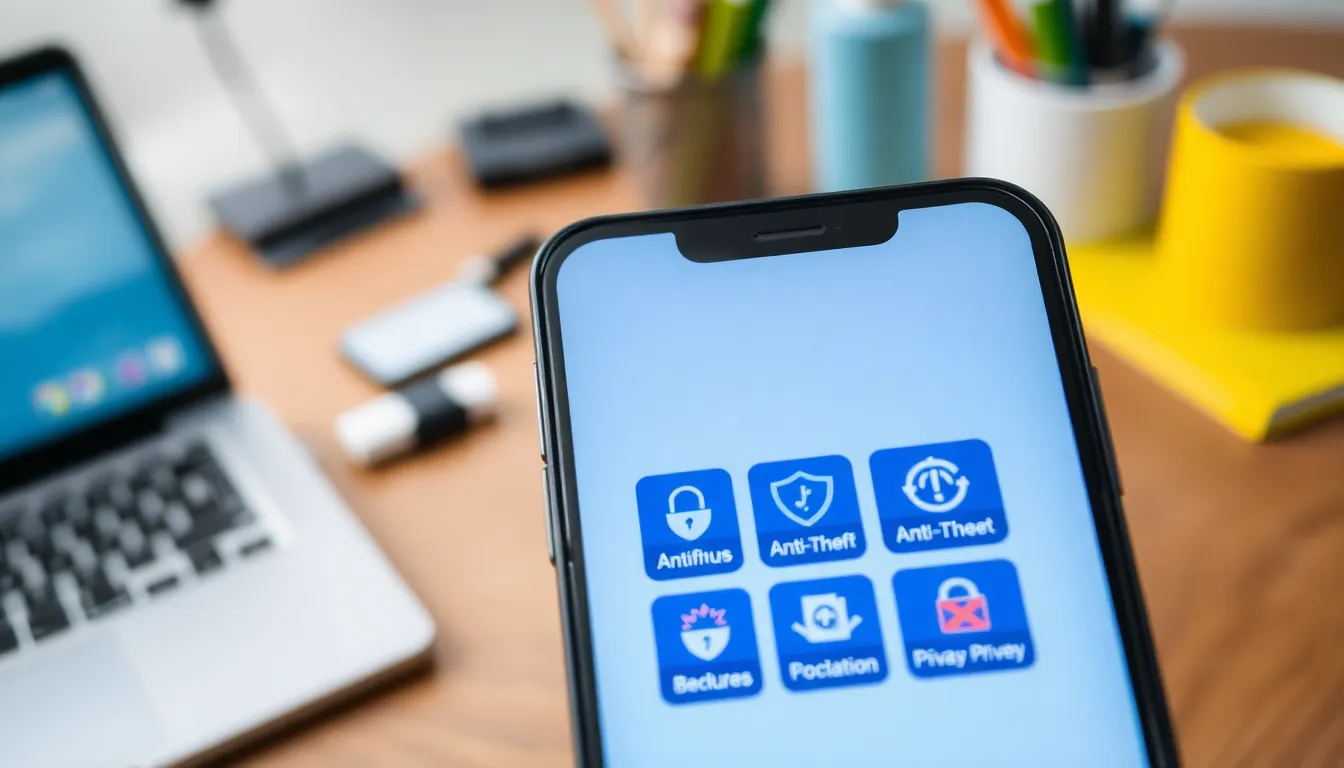Table of Contents
ToggleIn today’s digital age, mobile devices are central to daily life, making them prime targets for cyber threats. With personal data stored in apps and on devices, ensuring mobile security has never been more crucial. Mobile security apps offer a vital line of defense, protecting users from malware, phishing attacks, and unauthorized access.
As cybercriminals become increasingly sophisticated, the need for robust security solutions grows. Mobile security apps not only safeguard sensitive information but also provide features like remote wiping and anti-theft measures. By understanding the importance of these tools, users can take proactive steps to secure their devices and maintain their privacy in an ever-evolving digital landscape.
Overview of Mobile Security Apps
Mobile security apps play a crucial role in protecting devices from various cyber threats. These applications offer multiple features designed to safeguard personal information, enhance privacy, and prevent unauthorized access.
Key functionalities include:
- Malware Protection: Mobile security apps detect and eliminate malicious software that may compromise device integrity. They regularly update their databases to recognize the latest threats.
- Phishing Prevention: These apps identify suspicious links and emails, helping users avoid falling victim to scams. They employ real-time scanning to alert users of potential risks.
- Remote Wiping: In case of device loss or theft, security apps provide options to remotely erase sensitive data. This ensures that personal information remains secure even if the device is not physically accessible.
- Anti-Theft Measures: Many mobile security apps incorporate features such as device tracking and alarm activation. These capabilities help recover lost devices and deter theft.
- App Locking: Some applications allow users to restrict access to selected apps with passwords or biometric authentication. This extra layer of security helps protect sensitive information stored within those applications.
- VPN Services: Virtual Private Network (VPN) integration can encrypt internet connections, ensuring secure browsing on public networks. This protects user data from potential interception.
Mobile security apps serve as essential tools for anyone looking to maintain device security in today’s digital landscape. While these apps vary in features, selecting reputable options can significantly enhance protection against evolving cyber threats.
Key Features of Mobile Security Apps

Mobile security apps offer various essential features to protect devices from cyber threats. These functionalities ensure users can confidently navigate the digital landscape.
Antivirus Protection
Antivirus protection serves as the first line of defense against malicious software. It identifies and removes viruses, spyware, and ransomware before they can cause harm. Regular updates ensure the protection database remains current, effectively catching newly emerging threats. Advanced scanning options allow for both quick and comprehensive scans, tailoring security needs to user preferences.
Anti-Theft Features
Anti-theft features safeguard devices against loss or theft. Device tracking enables users to locate their phones in real-time, providing a recovery option if misplaced. Users can activate alarms remotely, deterring thieves and alerting nearby individuals. Remote wiping capabilities allow users to delete sensitive information from the device if recovery seems unlikely, ensuring data security remains intact.
Privacy Protection Tools
Privacy protection tools enhance security by safeguarding personal information. These tools include app locking mechanisms that restrict access to sensitive applications, requiring authentication before opening. Virtual Private Network (VPN) services encrypt internet connections, preventing unauthorized interception of data, especially on public Wi-Fi networks. Additionally, phishing protection prevents users from interacting with fraudulent websites and emails, further securing their personal data.
Popular Mobile Security Apps Reviewed
Evaluating mobile security apps reveals a range of options tailored to meet various user needs. Each app offers distinct features that enhance device security.
App 1: Features and Pros
- Malware Protection: Scans apps and files for harmful software, providing real-time alerts.
- Web Protection: Blocks malicious websites and phishing attempts to safeguard online activities.
- Anti-Theft Features: Includes remote tracking capabilities and alarms for lost devices.
- User-Friendly Interface: Provides easy navigation and quick access to essential features.
App 2: Features and Cons
- Performance Impact: Some users report decreased device speed when running the security app.
- Subscription Costs: Advanced features often come with premium pricing, which can deter budget-conscious individuals.
- False Positives: Occasional misidentification of legitimate apps as threats causes user frustration.
- Limited Platform Compatibility: Certain apps function only on specific devices, limiting user options.
App 3: Unique Selling Points
- Cloud Backup Services: Offers cloud storage for secure data backups, enhancing data recovery options.
- VPN Integration: Provides a built-in virtual private network for secure browsing on public Wi-Fi.
- Privacy Tools: Implements advanced features like app locking and secure browsing to protect personal information.
- Regular Updates: Ensures continuous protection against emerging threats with frequent software updates.
User Experiences and Feedback
Users frequently share their experiences with mobile security apps, highlighting both positive and negative aspects. Reviews consistently emphasize the importance of intuitive interfaces, as many users prefer apps that are easy to navigate and configure.
- Effective Malware Protection: Many users report satisfaction with how well specific apps, like App 1, manage malware detection. Users note rapid identification and removal of threats, enhancing their trust in the app’s performance.
- User Privacy Focus: Reviewers appreciate features that safeguard privacy. Users often mention the effectiveness of app locking and VPN services in protecting sensitive data, particularly when using public Wi-Fi networks.
- Performance Considerations: Some users express concerns about performance impacts of certain applications. App 2 faces criticism for slowing device responsiveness, which some users find frustrating during everyday use.
- Value for Money: Users often assess pricing against functionality. Those who opt for subscription-based apps caution potential buyers about ongoing costs while discussing the importance of weighing this against advanced features and customer support.
- Customer Support Responses: Feedback highlights variable customer service experiences. Users note prompt assistance from some providers while citing slower response times from others, influencing overall satisfaction with the app.
- Feature Reliability: Users typically evaluate the reliability of features like real-time tracking and alarm activation. Positive feedback often centers on the success of these features in recovering lost devices and deterring theft.
These insights reflect users’ diverse experiences with mobile security apps, showcasing their varied needs and expectations in an increasingly complex digital environment.
Mobile security apps are essential tools for anyone looking to protect their devices and personal information in a rapidly evolving digital landscape. With cyber threats becoming more sophisticated every day, users must prioritize their mobile security.
Choosing the right app can make a significant difference in safeguarding against malware, phishing attacks, and unauthorized access. By leveraging features like remote wiping and anti-theft measures, users can enhance their peace of mind.
Investing in a reliable mobile security app not only protects sensitive data but also empowers users to navigate the digital world confidently. As technology advances, staying informed and proactive about mobile security is crucial for everyone.





